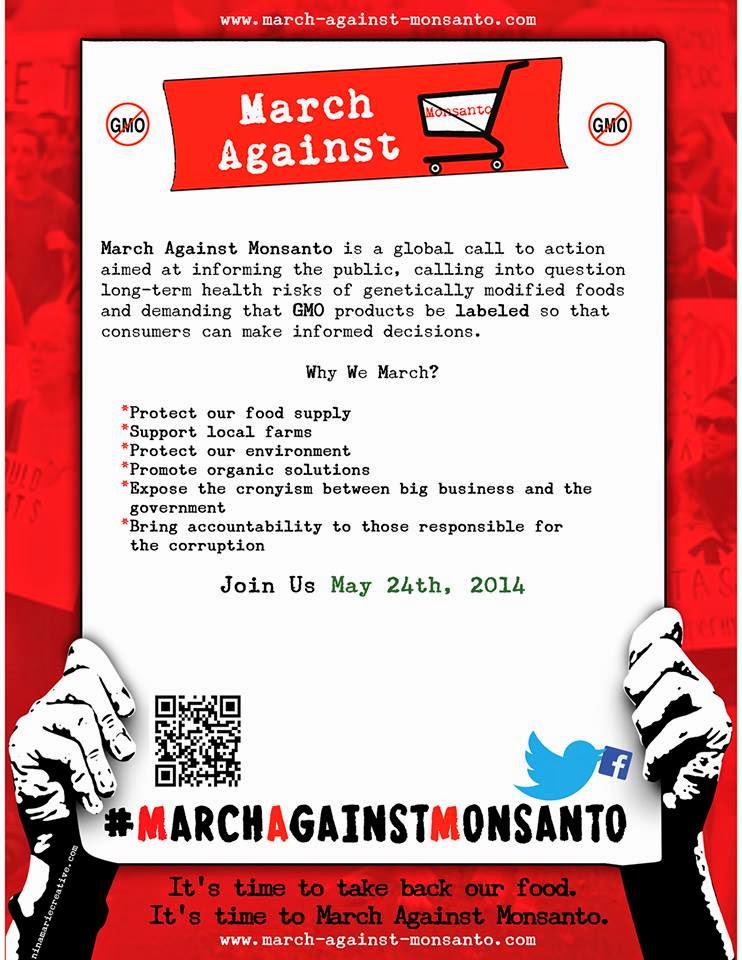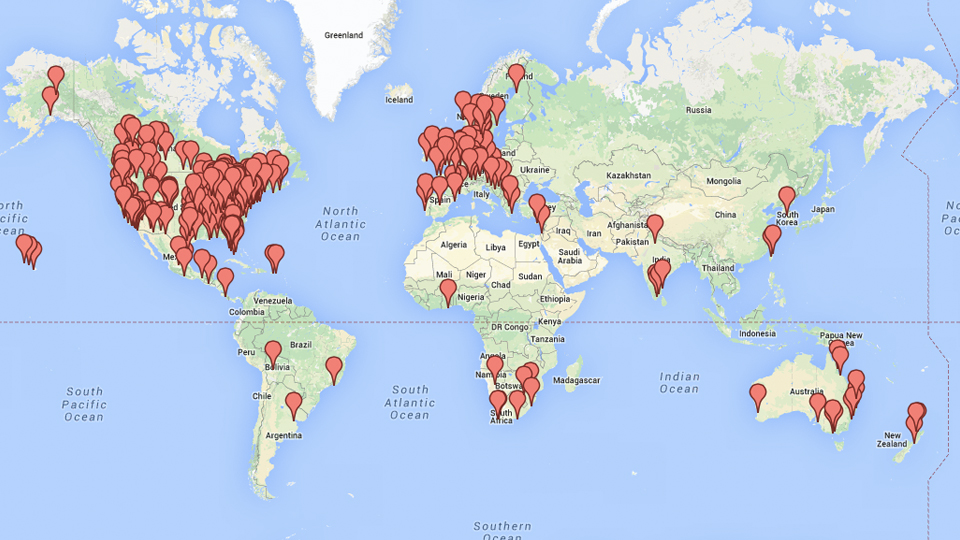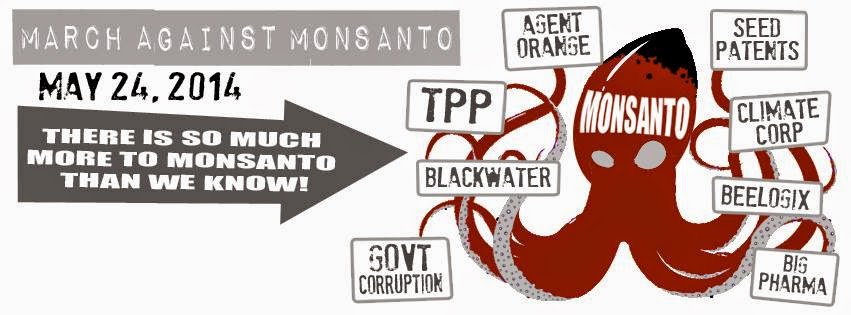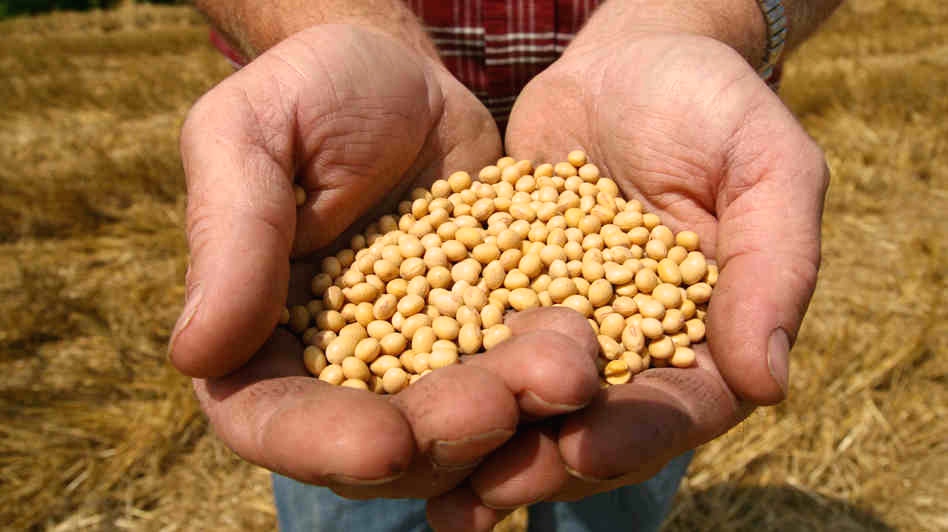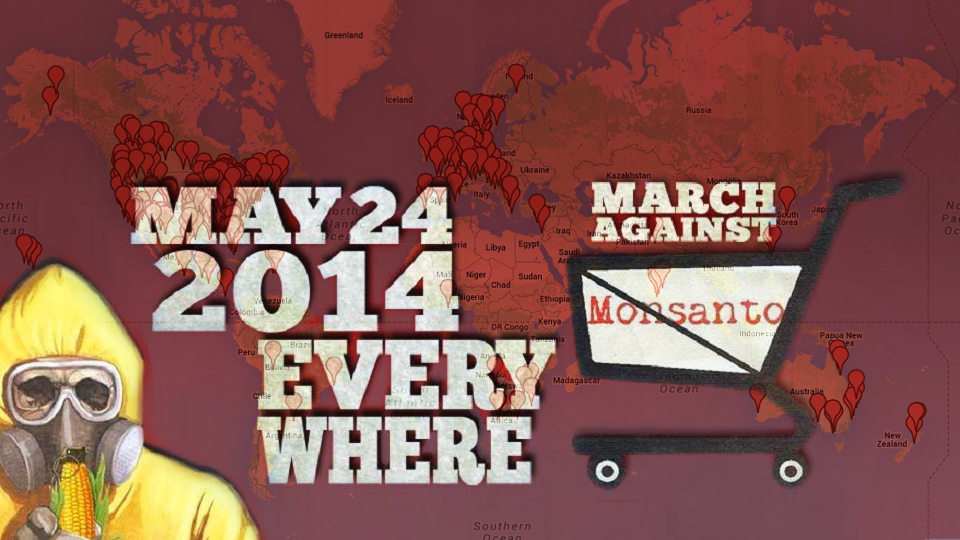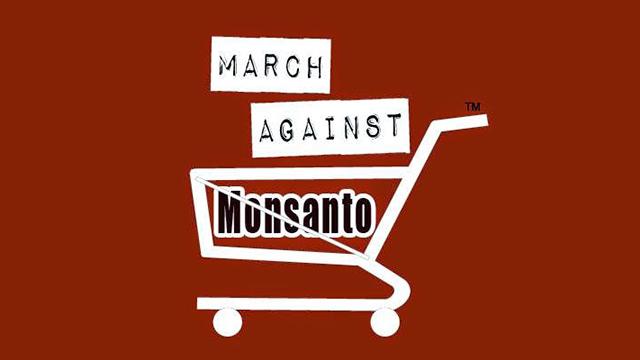
Almost 10 years ago, I watched a documentary titled The Corporation and was astounded at the breadth of injustice committed by big companies. One story in the film was about Vandana Shiva, an environmental activist and anti-globalization author based in Delhi. Shiva's story opened my eyes to the genetically modified crop practices of Monsanto, which link to the food that my family, friends and neighbors eat and share every day. What I began to learn disgusted me as much then as it does now.
This Saturday, May 24, millions of people around the world will once again March Against Monsanto, calling for the permanent boycott of genetically modified organisms (GMOs) and other harmful agro-chemicals. Marches will occur on six continents, in 52 countries, with events currently planned in over 400 cities. In the U.S., marches are slated to occur in 47 states. A comprehensive list of actions can be seen here.
What Is March Against Monsanto?
March Against Monsanto is a global call to action: informing the public, calling into question the long-term health risks of genetically modified foods, and demanding that GMO products be labeled so that consumers can make informed decisions.
Last May, more than 2 million people worldwide joined in the first ever March Against Monsanto . That event was followed five months later by millions more marching on October 12. Across the world, and in Europe in particular, national policies to eradicate Monsanto crops have been gaining popularity.
For resources about the March Against Monsanto happening this Saturday, May 24:
Click here to see the World Map of Peaceful Actions and Marches
Click here to see the full list of events, times, organizer contacts and more
Click here to get engaged via the Commons page
Solutions that last, for you and for me
There's clearly more mainstream emphasis on GMOs today than there was back when The Corporation was released. Label laws, oversight corruption, economic welfare for farmers, consumer awareness, shareholder activism, and other issues are now frequently raised when we talk about food from genetically modified sources fed to us by mega-corrupt corporations. The question for many remains: where do we go from here?
At this point, conversation invariably shifts to organics as the solution. But then we find ourselves trailing off into the price index and affordability issue of Organic vs GMO. Even local farm-fresh produce, dairy and meats will have either been grown from or fed a GMO seed, if they're not certified organic. And this begs the question: "How do I safely, and affordably, feed myself and my family?"
Nick Barnabe of The AntiMedia, and one of the founders and organizers of the March Against Monsanto, says: "The best that we can do is to create solutions that empower ourselves and our communities to build an autonomous, localized food system. This would inherently include less pesticides, less GMOs, more food security, less costs, less susceptibility to national disasters, and a decentralized network of healthy agriculture."
On the question of where do we go from here, Nick added that "controlling, corrupt and patent trolling companies like Monsanto are in the past," and "open source is the new economy."
Open source seeds are the source
Farming is expensive, both in labor and materials. Seeds are also an expensive product, and necessary in order to garden, farm or supply the agriculture industry. Also costly are the means by which companies produce the best yields, using chemicals and harmful processes that meanwhile damage the environment. However, the tech industry has taught us some very important strategies and tactics for building rich, sustainable programs through an open source culture – using seeds as the data source which allow our agriculture programs to feed billions of people.
In this sense, seeds are important to our cultural heritage and our future health – and it's as important you have a choice in terms of where your food is coming from, just as you choose where to live and work. As Irwin Goldman, from the Open Source Seed Initiative project, put it, "Vegetables are part of our common cultural heritage, and our goal is to make sure these seeds remain in the public domain for people to use in the future."
Agriculture, historically, has been a transparent operation. It has been labeled for centuries as honest work and a (necessary) labor of love. Therefore, it makes dead simple sense that the future is the past: open culture farming and agriculture, with seeds at the center of it all.
Things you can do today to join the open source seed culture
Set up your own community seedbank
Join The Global Alliance for Seed Freedom
Sign the Declaration on Seed Freedom
Become a Seed Defender to stop patents on seeds and protect seed sovereignty
Join the fastest growing Open Source Seed Bank
Find out about the Operation Seed Library (OpSeedLib), a new project in 2014 to create yet another open source seed library (YAOSSL) for everybody to use with ease and convenience, without all the GMOs.
Start Your Own Seed Library, building a model for sustainability while supporting other communities to create their own seed lending libraries and seed swaps.
Learn about Navdanya, or "nine seeds", symbolizing the protection of biological and cultural diversity, and the “new gift” for seeds as commons, based on the right to save and share seeds
Seeds of Love
At a time where mega corporations want to control our food, it is imperative that we stand together to protect our food, the planet and each other.
"in this earth in this earth in this immaculate field we shall not plant any seeds except for compassion except for love"
~ Rumi
If we start with open sourcing the seeds of life, we already have partners and inventors working on open source systems that eradicate weeds, monitor crops, increase yields, and quite simply, put the community back into agriculture.
What's Next?
"It is not about this huge event happening all on one day," concluded March Against Monsanto's Nick Barnabe. "The whole key to a food revolution is to empower millions of people to act locally in their communities, through share cropping, seed banks, and buying local, organically grown food.
"For farmers, the key is to make the choice not to support Monsanto, its malicious contracts, or its antiquated farming methods. To put it simply: we are here to take our own food supply back."
Check out these Twitter handles & accounts for important further information:
@OpMonsanto, @OpSeedLib, #OpMonsanto, #OpMonsanto, #OpSeedLib, #GMOFree and #WaveOfActionFacebook
For websites relating specifically to Monsanto and efforts to dethrone it:
March Against Monsanto, March Against Monsanto on Facebook, Stop Monsanto, Global Revolution, Occupy Monsanto, Occupy Commons and Wave Of Action
For more valuable information and resources
- Novel Open Source Seed Pledge aims to keep new vegetable and grain varieties free for all
- Hudson Valley Seed Library
- Open Source Seed Initiative (OSSI)
- Operation Monsanto Stock Plunge: The Divestment Movement Expands to GMO's
- Seed Savers Exchange
- Richmond Grows Seed Lending Library
- Seed Saving Resources
We will be pushing out more actionable insights on this and other related food and agriculture topics – so stay tuned, and stay busy.
3 WAYS TO SHOW YOUR SUPPORT
- Log in to post comments

